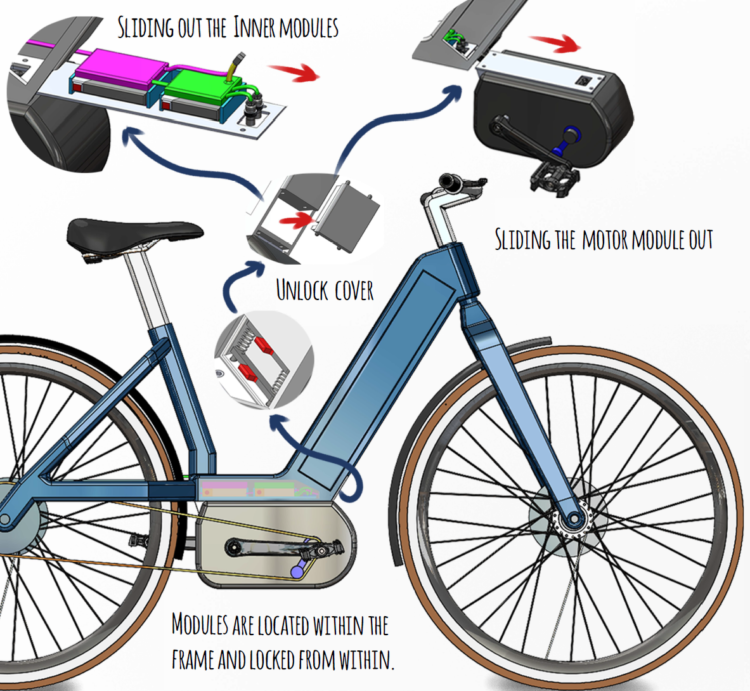Design of a modular E-bike system
Feb 2020 - ongoing
By: Ralph Wiersema

With this project, we aimed to design a modular system to help the company realize a circular E-bike for shared E-bike fleet owners.
The context
Shared E-bike mobility is rapidly growing worldwide. The lack of sustainable end-of-life practices of shared E-bikes results in excessive E-bike waste. The company aims to reduce E-bike waste by designing a profitable circular E-bike in combination with providing a product-service system. Modularity is the driving factor for the circular E-bike, and the product-service system.
The problem
the company aims to design a single modular bike platform that can be used by all fleet owners searching for a sustainable and cost-saving solution. The vision for the modular E-bike is to achieve differentiation and low-costs. However, the specifics for the modular design were not set. To make the E-bike into a viable product, we must choose modules, their location, and the connection between them, which are all interdependent. The initial assignment only focused on connecting the modules. However, to connect the modules, we need to think about the location and the module specifics as well.
Method
We started with understanding the design goals and identifying the challenges. In the research, we analyzed the existing problems for the fleet owners and their origin. We then defined the right approach to implement modularity to tackle the identified problems. Next, we followed a top-down design approach to tackle the identified problems by integrating the specific modular solution. In the design process, we first designed a product architecture for the modules. Second, we designed interfaces to connect these modules.
Findings
In the fleet owner problem analysis, we identified that fleet owners commonly suffer from high total cost of E-bike ownership resulting from the high maintenance and replacement costs of their E-bike fleet. Moreover, we identified that fleet owners require sustainable business operations to meet regulations and to establish a positive brand image. Sustainable business operations are currently un-achievable because the presently used shared bikes have no economic, sustainable end-of-life purpose. We concluded that to become and stay profitable, fleet-owners should reduce the cost of E-bike ownership and improve their sustainability. We identified that a durable E-bike design with a circular end-of-life purpose could solve the main problems for fleet owners. This E-bike sustains long-term value and enables sustainable business practice. The boundary condition for long term circularity is a future robust design. The E-bikes’ durability reduces upkeep frequency. Modularity enables the exchange- and interchangeability of (future) functional and aesthetical modules, which are critical for repairability and long-term re-usability of the E-bike. Decomposability of the modular system, thus accessibility of replacement of faulty and obsolete modules, is the key-necessity for E-bike repairability and upgradeability.
Results
We designed a durable modular system focused on circular end-of-life. The company can integrate the modular system in its circular E-bike concept. With the modular system design, we proposed a durable solution for the E-bikes’ architecture, combined with interfaces that enable cost-efficient repair and the alteration of functional modules. Although the system is in a conceptual stage, it provides working principles to tackle the fleet-owners problems. The proposed concept Is different from the original companies’ platform concept. Still, it gives the company with a specific direction for future concept development. The proposed working principles, however, require more particular decisions and design efforts for practical implementation in the final E-bike design, and to achieve a realistic final E-bike design revolved around the modular system. For the final realization of their E-bike concept, the company should test the principles in real life and decide on a target group to develop its E-bike concept further
Supervisory Team
Prof. dr. Balkenende, A.R